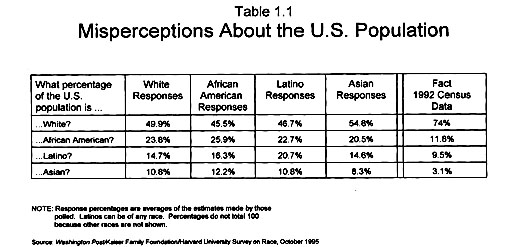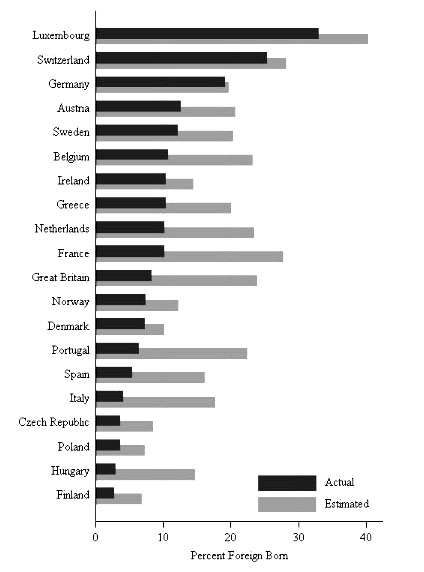Misperception of minorities and immigrants
http://www.stat.columbia.edu/~cook/movabletype/mlm/ Statistical Modeling, Causal Inference, and Social Science] is statistcs Blog. It is primarily written by Andrew Gelman, a professor in the Departments of Statistics and Political Science at Columbia University.
In a July 1,2005 posting Andrew continues an earlier discussion on mispercetion of minorities and minorities. This earlier discussion was inspired by a note from Tyler Cowen reporting that the March Harper's Index includes the statement:
-Average percentage of UK population that Britons believe to be immigrants: 21
-Actual percentage: 8%
Harpers gives as reference the Market & Opinion Reserch Inernational (MOı) but the only results on this issue we could find were in a Readers Digest (UK) report (November 2000) of a study "Britain Today - Åre We AN Intolerant Nation?" that MORi did for tthe UK Readers Digest in 2000. The Digest reports:
- A massive eight in ten (80%) of British adults believe that refugees come to this country because they regard Britain as 'a soft touch'.
- Two thirds (66%) think that 'there are too many immigrants in Britain'.
- Almost two thirds (63%) feel that 'too much is done to help immigrants'.
- Nearly four in ten (37%) feel that those settling in this country 'should not maintain the culture and lifestyle they had at home'.
The Post/Keiser/Harvard included the following data:
The Digest gose on to say:
- Respondents grossly overestimated the financial aid asylum seekers receive, believing on average that an asylum seeker gets £113 a week to live on. In fact, a single adult seeking asylum gets £36.54 a week in vouchers to be spent at designated stores. Just £10 may be converted to cash.
- On average the public estimates that 20 per cent of the British population are immigrants. The real figure is around 4 per cent.
- Similarly, they believe that on average 26 per cent of the population belong to an ethnic minority. The real figure is around 7 per cent.
This is pretty close to the Harper's Index and it also gives us some idea why the respondants might over-estimate the percentage.
The Harper's Index comments reminded Andrew of an article in the Washington Post by Richard Moral (October 8, 1995) in which he discussed the results of a Post/Keiser/Harvard survey "Four Americas: Government and Social Policy Through the Eyes of America's Multi-racial and Multi-ethnic Society"
The Keiser report includes the following data:

Gelman remarks that John Sides sent him following data on the estimated,and actual percentage of foriegn-born residents in each of 20 Euopean countries:

You will find further discussion on this topic by Andrew and John on the July1, 2005 posting on Andrew's blog.
DISCUSSION QUESTION:
(1) What explainations can you think of that might explain this overestimation. Can you suggest additional research that might claify what is going on here?